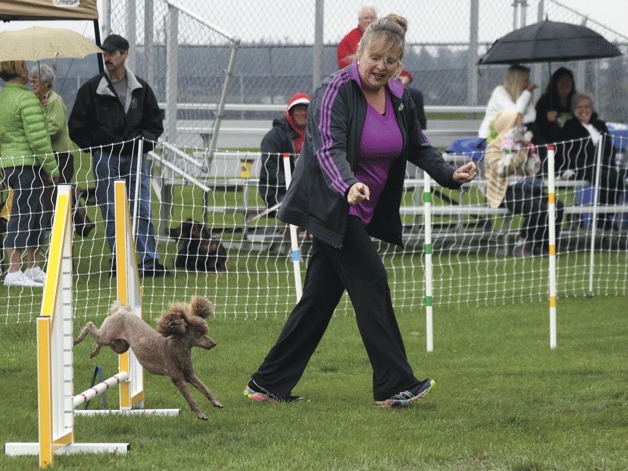It was clear by the cadence in Craig Dolphin’s voice that he was a bit exasperated.
“Kiera!” he shouted as his young, flat-coated retriever decided to stop and sniff the grasses.
“Kiera!” he shouted again as another scent sent her off course.
Maybe it was the fresh sea air at Windjammer Park in Oak Harbor that flared Kiera’s nostrils. Whatever it was, Kiera got what Dolphin called the “zoomies” at the Dog Agility Trials Sunday.
“It pretty much means they get so excited and overstimulated by the environment,” Dolphin said. “It’s her first outdoor trial.”
Such distractions weren’t uncommon at the three-day American Kennel Club-sanctioned event run by the Bell Vernon Kennel Association.
Dogs and handlers of all expertise levels were on hand in the fast-paced competition against obstacles and the clock.
“Here, Jeeves! Go get a weave!” Pam Rogge shouted to a chocolate-colored toy poodle in the “jumpers with weaves” course that involves weaving through poles and leaping over jumps.
Rogge, a middle school counselor in Port Townsend, then sprinted alongside her poodle to urge her on, bursting out commands in rapid succession.
“Weave! Weave! Weave! Weave!
“Go Jeeves. Go! Go! Go! Go!”
Jeeves has made so many solid runs he’s closing in on an AKC master agility championship. But it wasn’t the idea of fancy awards that lured Rogge to the dog sport.
“You need to keep your mind and body active when you’re getting close to retirement age,” she said.
Robin Kletke of Woodinville has been involved with dog agility competitions since the sport got popular in the mid 1990s. He brought six dogs to the Oak Harbor trials and also spent a day judging the competition.
Kletke, who also teaches dog agility, wasted little time directing his dog through obstacles Sunday. He enjoys the competitive part of the events.
“I like running fast,” he said. “For me you get a good run out there. It’s sort of like a dance.”
Several of Kletke’s dogs are nationally competitive, including a tri-colored papillon named Tigger, who once won a national invitational.
“He’s the winningest dog in the history of the American Kennel Club,” Kletke said. “He has the most championships, the most points. He has three national championships, a national invitational championship. He’s done it all. He’s almost 15 now.”
Many of the handlers at the weekend event consider their dogs an extension of their families. It’s common to run into a dog owner who’s retired, has grown children, and now puts their time and resources into their dogs.
An entry fee for trials such as the one in Oak Harbor can be $150 per dog.
“What happens is, people when they’re younger they have children and all the money goes for the children,” said Jean Wells, a Coupeville dog trainer and co-chair of the Dog Agility Trials along with Oak Harbor’s Susen Dasch. “They might have a dog along the side but it doesn’t get all the attention. It’s just a dog.
“Then all of a sudden, the kids leave home and guess what? Fluffy becomes your fur kid.”
Wells laughs.
“All of a sudden, all your money, your attention goes to playing with these dogs,” she said. “You see this a lot with a lot of older people.”
And like with children, a close bond forms. Wells travels with Dasch in a motorhome to various trials around the Northwest with their Australian shepherds Diggity and Derby and Wells’ miniature poodle Moxy as constant companions.
And such attachments only make loss that much more difficult.
In 2011, Dolphin and his wife Karen lost their high-achieving dog Sylvie to cancer. In their early 40s and residents of the small Whatcom County town of Custer, they got involved with advanced training and competitions to spend time with their dogs. They don’t have children.
“It’s definitely more about just building the relationship with the dog, which has its pros and cons because when you get that close to your dogs and you become a team, when you lose them, it really is hard to deal with,” Craig Dolphin said. “But it’s worth it.”



